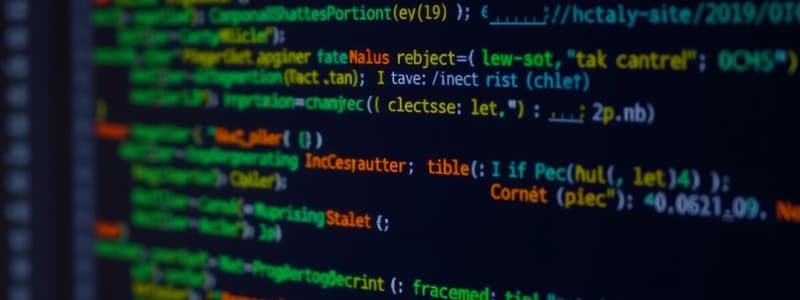Podcast
Questions and Answers
What defines a sequence in programming?
What defines a sequence in programming?
- A type of loop that repeats instructions
- A series of instructions executed one after the other (correct)
- A variable assignment operation
- A branching decision-making process
Which of the following best describes a condition in programming?
Which of the following best describes a condition in programming?
- A logic statement that evaluates to true or false (correct)
- A set of instructions that loop indefinitely
- A command that executes unconditionally
- An expression that can only be true
What is the purpose of selection control structures in programming?
What is the purpose of selection control structures in programming?
- To choose between different paths based on conditions (correct)
- To create independent modules of code
- To repeat instructions numerous times
- To assign values to variables
What is iteration commonly referred to in programming?
What is iteration commonly referred to in programming?
How does modularisation benefit programming?
How does modularisation benefit programming?
What is a key goal of efficient programming?
What is a key goal of efficient programming?
What does maintainability refer to in programming?
What does maintainability refer to in programming?
What aspect of reliability is crucial for a program's performance?
What aspect of reliability is crucial for a program's performance?
Study Notes
Programming Concepts
-
Sequence: Represents a series of instructions executed in a specific order, crucial for procedural programming.
-
Assignment: Involves assigning a value to a variable using the equal sign (
=), which establishes a memory reference for future operations. -
Condition: A logical expression that resolves to true or false, used for decision-making in programming (e.g.,
age > 19). -
Selection: A control structure for making decisions, allowing branching paths based on conditions. Common structures include
IF,ELSE, andELSEIF. -
Iteration: Executes a set of instructions repeatedly, commonly referred to as loops, facilitating tasks that require repeated actions.
Programming Efficiency
-
Efficiency: Refers to the program's ability to perform tasks using minimal resources (time, processing power). It evaluates whether the execution is linear or utilizes conditional statements to optimize performance.
-
Maintainability: The ease with which code can be read, understood, and modified. Clear, well-structured code helps prevent errors during updates, thereby ensuring that changes do not disrupt interdependent modules.
-
Reliability: The code's robustness in handling unexpected input values. Reliable programs execute tasks accurately and consistently. Testing and addressing usability concerns enhances reliability, allowing for proactive error management.
Studying That Suits You
Use AI to generate personalized quizzes and flashcards to suit your learning preferences.
Description
Test your knowledge on fundamental programming concepts including sequences, assignments, conditions, selections, and iterations. This quiz will help reinforce your understanding of how these elements work together in programming logic.




